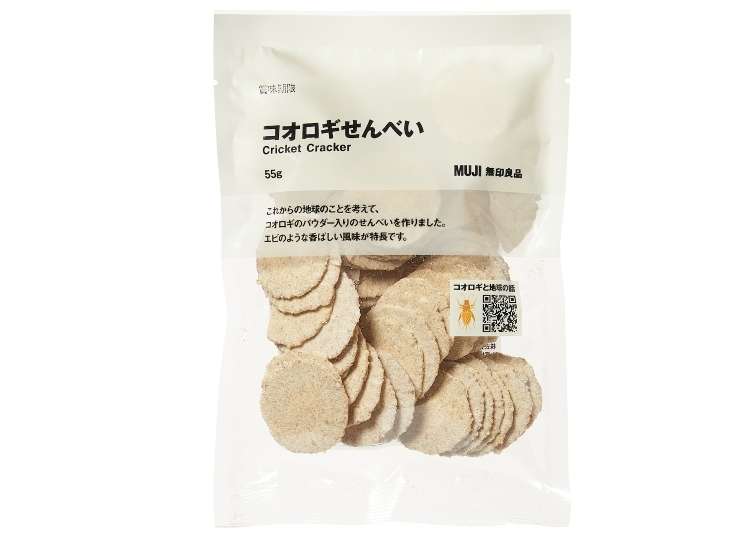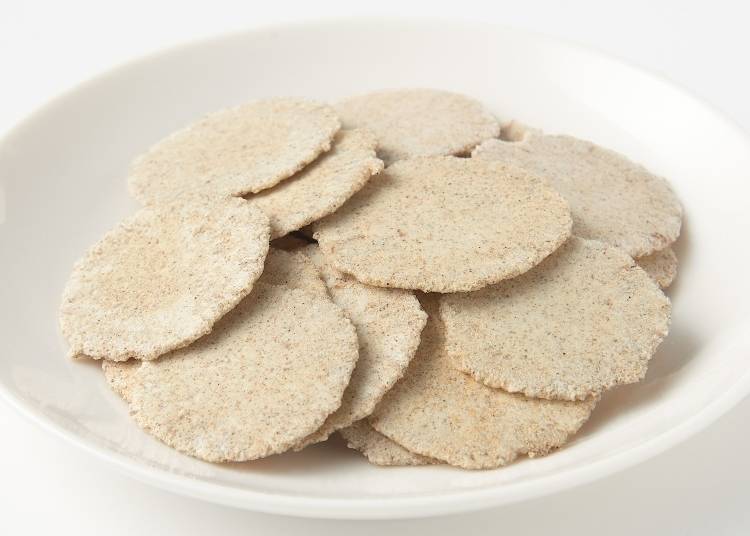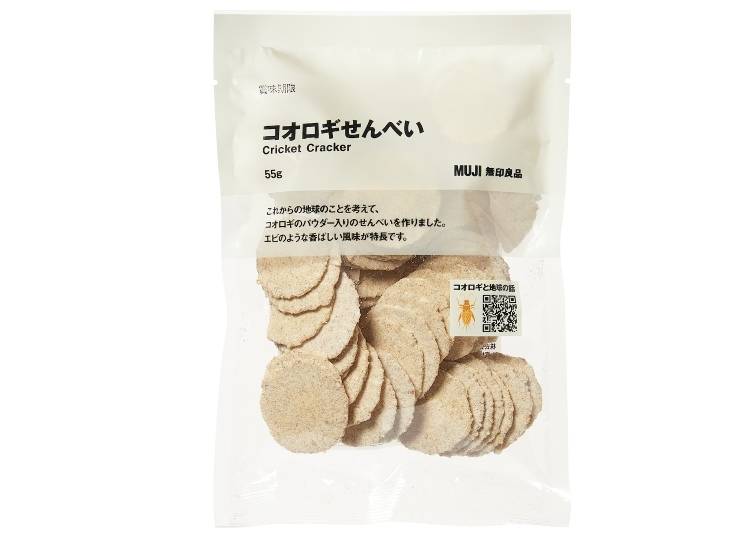
MUJI Debuts Cricket Crackers?! Japan’s Final Frontier for Sustainable Snacks
- Written by: HanaSara Ito
Senbei, or Japanese rice crackers, are one of the most popular and important snacks in Japanese culture. Often flavored with sesame oil or soy sauce, these are ubiquitous in every household not just for personal use, but as something to keep on hand for guests dropping by.
For the most adventurous of senbei lovers comes a new kind of rice cracker, coming out of a collaboration between Dr. Takato Watanabe of Tokushima University and Ryohin Keikaku, the product supplier and general factory powerhouse behind popular Japanese lifestyle brand MUJI.
MUJI was originally sold as an alternative to expensive (but well-designed) products. Literally meaning, “No-Seal”, MUJI eliminated branding or advertising on their home, design, and food products. As minimalist Japanese style becomes popular around the world, MUJI has become a powerhouse in its own right with its company culture of conscious consumption and making the world a better place.
But what could a retailer do with senbei that would merit news headlines? The answer might surprise you.
As part of their conscious effort to reduce water consumption and move food toward a more sustainable future comes MUJI Korogi Senbei. Crispy and crunchy, these savory crackers are said to have a taste not unlike a shrimp chip or cracker. The only difference? It’s made with crickets.

After doing research in Finland, the foremost frontier in edible insect research, the team behind MUJI Korogi Senbei wanted to make a product that took advantage of the incredible protein content insects provide. Made by mixing cricket meal with rice, MUJI Korogi Senbei tastes good enough to have you reaching for another as soon as you’ve crunched one down.
The United Nations Food and Agriculture Organization also recommends insect meal as an alternative to traditional livestock, boasting significantly less water and land usage. Insects also require a fraction of the food and breed much more quickly.
Crickets, in particular, were picked for this project due to their ability to breed quickly and thrive in Japanese conditions. The crickets used in MUJI Korogi Senbei are special “Futahoshi crickets”; while normally a primarily tropical breed, these are raised in a totally hygienic and sanitary laboratory environment. They have kept the cricket breeding domestic as well, to ensure a safe supply system of food and get closer to MUJI’s goal of self-sustainability.
This is not a product where the crickets are hidden: rather, the taste is made front and center, for a unique treat you and your guests will be awed by! Currently only available to pre-order online due to COVID-19, only those following MUJI on social media will be privy to the secret release date, but act fast-- once they’re gone, they’re gone.

One 55 gram bag of Korogi Senbei goes for 190 yen plus tax. Note that if you are allergic to shellfish or shrimp products, do not eat Korogi Senbei: there are similar chemical compounds.
Take a bag home and shock your friends -- or shock yourself with how much you want more!
HanaSara Ito is a writer, actor, and educator born in Japan and raised in the U.S.A. She loves writing about her experiences across Japan, and hopes everyone enjoys the beautiful amalgam of novelty and tradition that defines modern Japan. Happy trails!
*Prices and options mentioned are subject to change.
*Unless stated otherwise, all prices include tax.
Popular Tours & Activitiess
Recommended places for you
-

ISHIDAYA Hanare
Yakiniku
Kobe, Sannomiya, Kitano
-
Appealing

Rukku and Uohei
Izakaya
Sapporo / Chitose
-
Goods

Yoshida Gennojo-Roho Kyoto Buddhist Altars
Gift Shops
Nijo Castle, Kyoto Imperial Palace
-

Kanzenkoshitsuyakinikutabehodai Gyugyu Paradise Sannomiya
Yakiniku
Kobe, Sannomiya, Kitano
-

Jukuseiniku-to Namamottsuarera Nikubaru Italian Nikutaria Sannomiya
Izakaya
Kobe, Sannomiya, Kitano
-

Kambei Sannomiyahonten
Yakiniku
Kobe, Sannomiya, Kitano
-

Where to Buy a Japanese Kitchen Knife? Why Travelers Choose MUSASHI JAPAN's 14 Stores in Tokyo, Kyoto, and Nara
by: Guest Contributor
-

PokéPark KANTO Is Finally Open! Tokyo's New Pokémon World Starts Before You Even Arrive (2026)
by: Guest Contributor
-

Top 3 OSHI MAPs for the Best Matcha and Sweets in Tokyo
by: Guest Contributor
-
Ad

The Whisper of a 1,300-Year-Old History: Meet the Other Face of Nara at Night
by: Shingo Teraoka
-

Farewell, Heavy Suitcases! Keisei Ueno’s New Service Makes Your Last Day in Tokyo Totally Hands-Free
by: Guest Contributor
-

To the Holy Land of Kawaii! Odakyu Tama Center Station Is Becoming a Dreamy Sanrio Wonderland
by: Guest Contributor
-

Tokyo's Free Sightseeing Buses - Explore the City, the Comfortable Way!
-

Universal Studios Japan: Guide to Osaka's Giant Theme Park Attractions!
by: WESTPLAN
-

Visiting Osaka in Summer (June/July/August): Weather, What to Wear & Must-Visit Attractions for Adults & Kids
by: WESTPLAN
-

Seiyudo Katanas: Japanese Sword Heaven in the Heart of Tokyo (Video)
-

5 Popular Things to do in Umeda - Osaka's Central Area!
by: WESTPLAN
-

3 Best Hotels in Ikebukuro: The Best Place to Stay in Tokyo For Sightseeing!
- #best sushi japan
- #what to do in odaiba
- #what to bring to japan
- #new years in tokyo
- #best ramen japan
- #what to buy in ameyoko
- #japanese nail trends
- #things to do japan
- #onsen tattoo friendly tokyo
- #daiso
- #best coffee japan
- #best japanese soft drinks
- #best yakiniku japan
- #japanese fashion culture
- #japanese convenience store snacks













